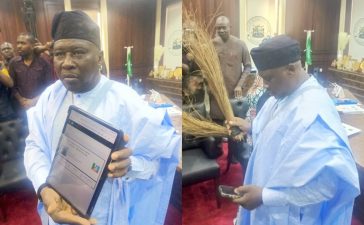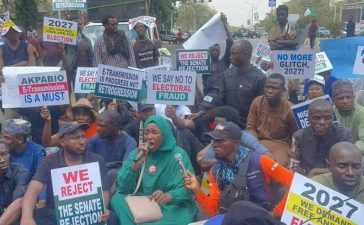The Federal Government has mobilized a significant force of 10,000 personnel from the Nigeria Security and Civil Defence Corps (NSCDC) to combat the increasing pipeline vandalism and safeguard critical infrastructure in Rivers State.
This move comes in the wake of a series of explosions at oil installations in the state between Sunday and Tuesday, which have escalated concerns about the security of the nation’s oil assets.
The Deployment of Security Forces
In a statement released on Wednesday, NSCDC spokesperson Afolabi Babawale confirmed that the deployment was aimed at curbing further attacks on oil pipelines, particularly in the Niger Delta region.
Babawale stressed that the personnel would collaborate with other security agencies to ensure the protection of national assets and prevent sabotage of the country’s oil and gas infrastructure.
He further warned vandals that any attempt to destroy critical infrastructure would not be tolerated, as the government strives to protect the economic lifeblood of the nation.
The explosions, which were linked to pipeline vandalism, occurred just days before President Bola Tinubu declared a state of emergency in Rivers State on Tuesday. This decision came after heightened tensions in the state, where three explosions rocked oil installations, leading to growing concerns over the safety of oil infrastructure.
Political Uncertainty and Emergency Rule
The emergency rule in Rivers State has sparked political unrest, particularly among opposition lawmakers and labor unions.
On Tuesday, President Tinubu announced the suspension of Governor Siminalayi Fubara, his deputy, Prof Ngozi Odu, and members of the state assembly, appointing Vice Admiral Ibok-Ette Ibas (retd.) as the state’s sole administrator for an initial six-month period.
The announcement has ignited protests from opposition parties, especially after the Rivers State Assembly—loyal to former Governor Nyesom Wike—initiated impeachment proceedings against Fubara.
Before the suspension, Fubara faced allegations of misconduct, and a proposed impeachment was set in motion by lawmakers loyal to Wike, who cited 19 infractions. The political climate in the state has been charged, and the threat of violence looms large, with groups vowing to disrupt oil production.
Pipeline Explosions and Security Breaches
The situation in Rivers escalated over the weekend, with an explosion on the Trans Niger Pipeline (TNP) in Aluu, a community in the Ikwerre Local Government Area.
The explosion, which occurred on Sunday, killed a suspected vandal, and a second suspect was arrested after security agencies investigated the scene.
The Nigeria Police, following credible intelligence from Pipeline Infrastructure Nigeria Limited (PINL), apprehended the suspect, and further investigations are underway to identify all those involved in the sabotage.
Babawale reaffirmed that the NSCDC’s role is critical in safeguarding pipelines, stating, “The Nigeria Security and Civil Defence Corps has a statutory mandate to protect critical national assets and infrastructure. We are on high alert to prevent all forms of economic sabotage and ensure national security.
” His remarks reflect the government’s focus on improving safety in the Niger Delta, where oil production remains a significant contributor to Nigeria’s economy.
Troops and Military Presence in Port Harcourt
Meanwhile, in Port Harcourt, the seat of the Rivers State government, a visible military presence has increased following the emergency declaration. Armored Personnel Carriers (APCs) were stationed at key locations, including the entrance to the Government House.
Local observers reported seeing more soldiers arriving in convoy, with some speculating that they were part of an advanced team preparing for the arrival of the new sole administrator, Vice Admiral Ibas.
Governor Fubara, as of Wednesday, was reported to have left the Government House under heavy security.
His whereabouts remain unclear, with sources suggesting that he may have retreated to his private residence in Port Harcourt or his hometown in Opobo. Security around the government building has been tightened, with soldiers taking control of the premises.
Legislative Backlash and Legal Debate
The political fallout from the emergency rule has reached the National Assembly, where lawmakers are set to debate the legality of the President’s action.
On Wednesday, the House of Representatives postponed the reading of President Tinubu’s letter on the Rivers State crisis.
A heated debate ensued in the chamber, with some lawmakers questioning the constitutionality of suspending democratic structures in the state. Notably, two female lawmakers, Blessing Amadi and Marie Ebikake, exchanged harsh words over the matter, calling attention to the potential implications for Nigeria’s democratic processes.
While the President’s letter was not read during the session, lawmakers are expected to address the issue in plenary today.
According to parliamentary rules, at least 73 senators and 240 House members must vote in favor of the emergency rule for it to be upheld.
Ibas Takes Oath as Sole Administrator
On Wednesday, Vice Admiral Ibok-Ette Ibas (retd.) was sworn in as the sole administrator of Rivers State at the State House in Abuja.
The ceremony, attended by key officials including the Attorney General of the Federation, Abubakar Malami, and the Chief of Staff to the President, Femi Gbajabiamila, marks the beginning of Ibas’ tenure.
Ibas, a retired naval officer, was appointed after his successful tenure as the Chief of Naval Staff and more recently as Nigeria’s High Commissioner to Ghana.
Speaking after his swearing-in, Ibas pledged to prioritize peace, stability, and effective governance in Rivers State, focusing on restoring law and order. “My mandate is clear—to work with all stakeholders to ensure that stability is restored in Rivers State so that the people can return to meaningful governance,” he stated.
Looking Ahead
The situation in Rivers State remains fluid, with security forces on high alert as political and economic tensions continue to escalate.
The emergency rule, alongside the deployment of thousands of troops and security operatives, underscores the government’s commitment to maintaining control and preventing further damage to Nigeria’s vital oil infrastructure.
As lawmakers debate the constitutional legitimacy of the President’s actions, all eyes will be on Rivers State, where the political and security landscape may take a dramatic turn in the coming weeks.
Whether the deployment of troops will succeed in stabilizing the region or exacerbate the ongoing unrest remains to be seen.






